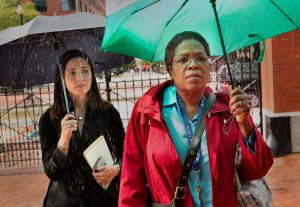I read this book not long ago and was really taken by it, inspired by it, moved by it. It’s non-fiction by Rebecca Skloot about a woman named Henrietta Lacks who had cells taken from her without consent while she was in the hospital being treated for cancer. She died shortly after but her cells lived on and live on still. They’re known as HeLa cells and they’ve been sold to labs the world over because hers were durable and prolific. Nearly every medical breakthrough since 1951 has used her cells in research and trials. Hela cells are the oldest immortal cell line in medical history. But Henrietta never knew,  was never asked. Her family didn’t know either. And when they found out, decades later, they were mortified. Without the education to understand what those cells really meant, they wondered if part of their mother was indeed still alive, being kept alive cruelly in labs, being shot into space, or injected with disease. And why had so many profited from the sale of HeLa cells while Henrietta’s family languished in poverty?
was never asked. Her family didn’t know either. And when they found out, decades later, they were mortified. Without the education to understand what those cells really meant, they wondered if part of their mother was indeed still alive, being kept alive cruelly in labs, being shot into space, or injected with disease. And why had so many profited from the sale of HeLa cells while Henrietta’s family languished in poverty?
The book tackled issues of informed consent, and ethics of race and class in medical research. The film, starring Oprah Winfrey as Henrietta’s haunted daughter, Deborah, and Rose Byrne as writer Skloot, loses some of what makes the book such a great read. But it’s still a great if upsetting introduction to Henrietta and the family that still grieves her. Deborah grew up without a mother, while thousands of scientists handled her cells on a daily basis. She knew almost nothing about her mother but now learns that her legacy includes the vaccine for polio, gene mapping, and cloning. Scientists have grown some 20 tonnes of HeLa cells, which have featured in over 60 000 research papers and 11 000 patents. Not a dime ever went to the Lacks family.
Winfrey gives a stirring performance as a heartbroken woman. Byrne is commanding as well. But for my money, the book is where it’s at – pick it up.

I loved the book too. Things were handled so poorly for that family by the medical establishment. Haven’t seen the movie, but I noticed the DVD was at my library, so maybe I’ll pick it up.
LikeLike
I finally saw this. I had recorded it months ago, but only had a chance to see it recently. It was kinda meh. I heard the book was so much better. But, still a good introduction to those that hadn’t heard the story.
LikeLike
Radiolab has done some interesting podcasts on Henrietta Lacks.
LikeLike
Going straight for the book. I can’t believe they did this, well I can I suppose, am amazed.
LikeLike
I never heard this story before. I will check out the book. What a legacy. Hopefully, if enough people know, the family can sue the labs that profited from her cells and at least give them enough money to rise from poverty.
LikeLike
Oprah is returning to acting…!
LikeLike
I was really looking forward to this then I ended up being so bored with it. I think I would give the book a try though.
LikeLike
I used to volunteer for medical experiments. It was nice to feel like I was contributing to knowledge and making a little cash too.
Going in there would always be consent forms, sometimes lengthy ones, that included permission for doctors to use my cells for other experiments. It’s hard to wrap my head around the implications of my cells being stored and used for other things, but the fact that they ask–are required by law to ask–is also part of the legacy of Henrietta Lacks.
It’s even harder to wrap my head around how terrible it is that she was never asked.
LikeLike
Yes, and her family was repeatedly lied to – they went back to the kids for samples but always said it was for some other thing.
We do need people like you who donate their time and even parts of themselves for the good of science, but informed consent is a pretty big deal!
LikeLike